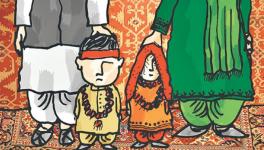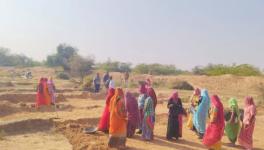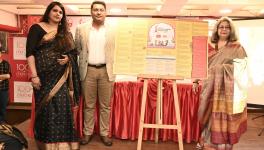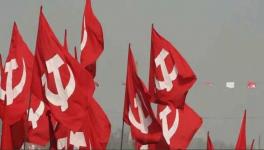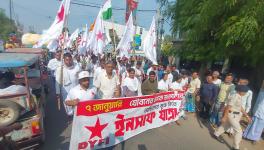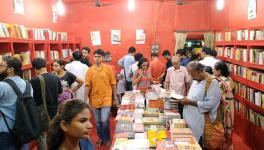UNICEF-Backed Interfaith Alliance Established in Kolkata With Developmental Goals
Kolkata: An inter-faith alliance was constituted for the first time in the country to fight key issues faced by society around health, nutrition, child rights, education, water sanitation, hygiene, and disaster risk reduction. Religious leaders of six different major religions of the country joined in the alliance on Wednesday.
In this regard, a booklet called ‘Faith for Life’ was also published and endorsed by the influential leaders of Hinduism, Islam, Sikhism, Buddhism, Christianity and Jainism.
Notably, the intervention of the religious leaders and the constitution of the Faith for Life campaign was first carried out in war-torn Nigeria by the United Nations International Children’s Emergency Fund (UNICEF).
Talking to NewsClick, UNICEF state head Mohd Mohiuddin said that in West Bengal, there are many harmful practices like lack of social awareness and ill notions that lead to the demand side of the various schemes falling short of the desired level. In a country like India, where religion is a big thing, the intervention of all religious leaders is expected to play an important part in working towards the goal.
Earlier in his speech, Mohiuddin said that it is a popular notion that science and religion are at loggerheads. The religious leaders think that they would not vouch for science that builds nuclear warheads and weapons of mass destruction. However, science that is welfare-oriented, such as medical science, is a thing that they vouch for, he said.
Speaking to NewsClick, MD Shah Alam, Chairman of Amanat Foundation, which co-hosted the event, said after the foundation’s establishment on July 19, 1994, its partner organisations like UNICEF have been instrumental in educational and livelihood development and creating awareness in backward areas after doing surveys.
The foundation also gives training in entrepreneurship marketing management and skill development techniques. The training programmes are primarily meant for members of the economically weaker section of the minority community. In 2003, the organisation partnered with the West Bengal state government when it faced hiccups in the Polio eradication programme and organised Muslim minority leaders to address their followers during khutbah before namaz. The interfaith handbook prepared by UNICEF and Amanat Foundation contains what religious texts like the Vedas, Bhagvad Gita, the Bible, Tripitok, Quran Sharif, and Grantha Sahib say about glaring issues like child rights, WASH (Water, Sanitation and health), nutrition and hygiene.
Alam added that in West Bengal, there are about two lakh Purohits and 65,000 Imams, 30,000 fathers of churches, several thousand Buddhist Bhikkhus and Granthis of Gurdwaras. This programme will highlight the positive sides of the issues plaguing humanity as a whole.
Earlier in the day, after an introductory speech by Jalaluddin Ahmad, General Secretary of Amanat Foundation, the objectives of the interfaith booklet were described by Alam and Mohiuddin, who underlined the importance of the concept. Then, one by one, the religious leaders spread across the different sects. It started with Quari Fazlur Rehman, Imam e Eidain of Red Road, Kolkata, presenting his view of what the Koran Sharif says about socioeconomic issues.
Chandan Chatterjee of Bangiyo Sanatan Brahman Sangathan spoke on behalf of the Hindus, and Bishop Francis Singha Roy spoke about the Bible’s views on the topic. On behalf of the Buddhists, Pragyarakhit Bhikkhu spoke about lord Buddha’s messages commensurate with the mottos of UNICEF and Amanat Foundation behind the booklet. On behalf of the Jain religion, Subhomoy Maji spoke on societal issues, whereas Sardar Tarsem Singh spoke to Sikhs. The programme was also addressed by Mrs Sucharita Bardhan, communication expert at UNICEF, who lauded the potential of the Interfaith Alliance.
Later, speaking to NewsClick, WASH expert and consultant of Amanat Foundation, Chaitali Mondal hailed the move as a revolutionary one in the Indian subcontinent. She informed that the UNICEF is gauging the response it is receiving in Kolkata, and then it will also emulate the programme in other parts of the country.
At the meeting, the Interfaith Alliance was formally launched and the core committee of the group was also formed. The Interfaith Alliance, at a later stage, will also be equipped to do relief work and raise money whenever needed to help destitute children and mothers in need. In this case, the religious leaders enjoy a very high trust level amongst the different members of that religion, she quipped, and the UNICEF and the Amanat Foundation expect to harvest this potential to achieve its societal goals.
Get the latest reports & analysis with people's perspective on Protests, movements & deep analytical videos, discussions of the current affairs in your Telegram app. Subscribe to NewsClick's Telegram channel & get Real-Time updates on stories, as they get published on our website.









